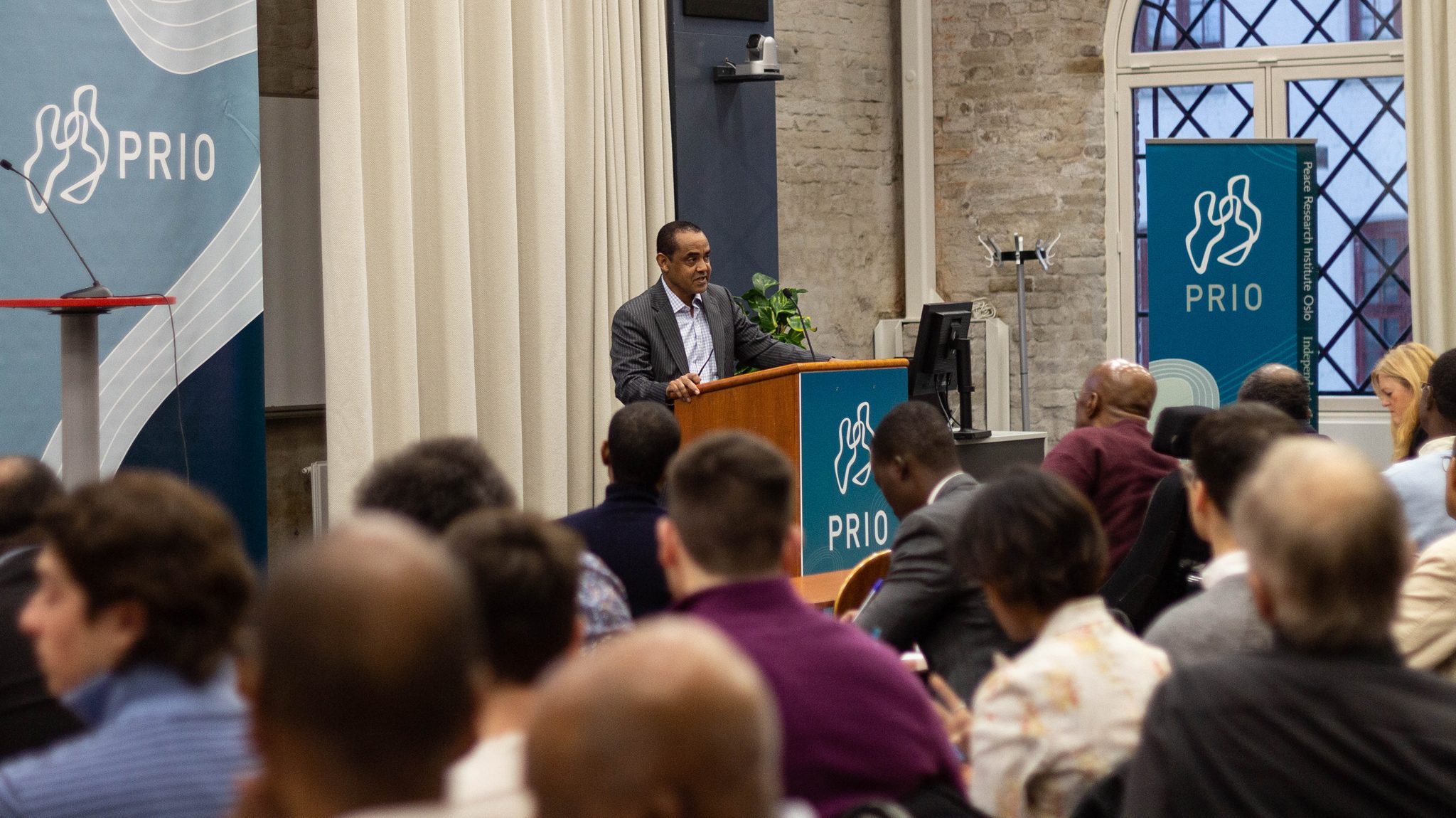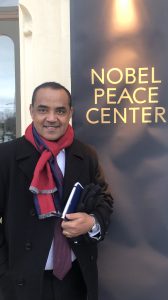
UM journalism professor Zenebe Beyene presents during Nobel Prize events in Oslo, Norway. Submitted photo
OXFORD, Miss. – When University of Mississippi journalism professor Zenebe Beyene was a student at Ethiopia’s naval academy in 1990, he found himself captured by the Eritrean People’s Liberation Front and became a prisoner of war.
From his office in Farley Hall, Beyene said the terrifying experience decades ago shaped his life. Zenebe, an assistant professor who is coordinator of international programs for the School of Journalism and New Media, teaches classes on media and conflict resolution and also peace journalism, which is aimed at equipping journalists to go beyond independent observations and drive conversations during times of great unrest.
Talking with Beyene for a few minutes reveals a man who was greatly affected by his time in captivity.
“(His captors) would do anything that pleased them,” Beyene said. “I was not bitter then. I am not bitter now because those people are victims, too. Those people who made my life miserable were victims of ignorance. Why would you hate other victims?”
He doesn’t go into many specifics about the horrors he endured during more than 20 months of captivity at the hands of the Eritrean People’s Liberation Front during the Ethiopian Civil War and the Eritrean War of Independence, which ended the same year he was captured. Eritrea ultimately won its independence from Ethiopia. This left his native country landlocked.
Beyene’s unique experience and impressive scholarship recently landed him an invitation to participate in a panel discussion at the Nobel Prize ceremony in Oslo, Norway, in December 2019. He spreads the message about the importance of preserving peace and stability in Ethiopia and beyond.
“From the eastern coast of Somalia to the western coast of Senegal, the ‘belt’ of Africa is in trouble,” Beyene said. “Ethiopia is one of the very few stable countries in the region. Because of that, Ethiopia has served as a center of gravity for a long time.
“Whatever happens in Ethiopia at the moment will have regional implications. What happens in Vegas stays in Vegas, but that principle doesn’t work when it comes to Ethiopia. If Ethiopia loses its stability, so does Africa.”
Despite his efforts to remain professional and independent, people still tend to label messengers as being part of one group or another and despite the accuracy of the information, it can still be seen as biased, he said. This is a result of an intensely polarized world, which made for some tense moments at the Nobel summit.

Zenebe Beyene, UM assistant professor of journalism, attends events connected to the Nobel Prize ceremonies in Oslo, Norway, in December 2019. Beyene is a former POW and a noted conflict resolution scholar. Submitted photo
Beyene was quizzed by an Ethiopian, a former prisoner who said he had been tortured, leaving him paralyzed. There was an anger and a bitterness in his remarks, Beyene said, so he tried to calm the man down. He let him know that he (Beyene) also was a POW and a victim of human rights violations, and he related to him on many levels.
That moment gave Beyene occasion to move the discussion from the past, and on to the future instead.
“I reminded him of that fact that whatever discussions we are having at that moment were not about him and were not about me,” Beyene said. “This was about our children. It wasn’t about yesterday; it was about tomorrow.
“How can we have genuine and honest conversations so that we can create a better world for all of us so our children and our grandchildren will live in peace?”
Besides the lively discussions and a chance to represent the university on a global stage, the Nobel trip also was fruitful in another way for Beyene. He met with Kjell Magne Bondevik, former prime minister of Norway and executive chair of the Oslo Center. Its mission is to globally work for world peace, democracy, human rights and religious tolerance.
Bondevik was struck by Beyene’s focus on peace, and the two men are in discussions for a possible project on reconciliation in the region. The effort is rooted in a simple, but important, idea.
“We need to reconcile with our history, and our own brothers and sisters,” Beyene said. “Most importantly, we need to reconcile with ourselves. This is the problem we are having in that part of the world.
“Unless we have genuine efforts to promote reconciliation, whether peace-building or nation building or economic development, they cannot be materialized. The foundation of everything is genuine reconciliation.”
When Beyene first arrived at Ole Miss, he taught in the Croft Institute for International Studies and in public policy and leadership because of his worldwide reputation as a specialist in media and conflict resolution. One of his students was Elam Miller, then president of the Associated Student Body, who told journalism Dean Will Norton that Beyene’s class gave him fresh insights into public policy and media.
Beyene, who holds master’s and doctoral degrees from the University of Nebraska, is a “celebrity in Ethiopia,” and the university is fortunate to have him here, Norton said.
“Students repeatedly tell me he is one of the best, if not the best, teachers they have had,” Norton said. “They tell me that he involves them in class discussions and, because of this, the class discussions are more relevant to their everyday lives.
“It is a privilege for students in our school to enjoy the broad perspectives and insightful details of a world leader in peace negotiations.”
Despite all the struggle he endured during his time in Ethiopia, Beyene sees himself these days as fortunate to see all he’s seen.
“I am incredibly blessed,” Beyene said. “God has given me an opportunity to witness this kind of history in the making. Ethiopia has been in the news for a long time, so I feel really blessed to be a part of witnessing this era when Ethiopia is being celebrated.”